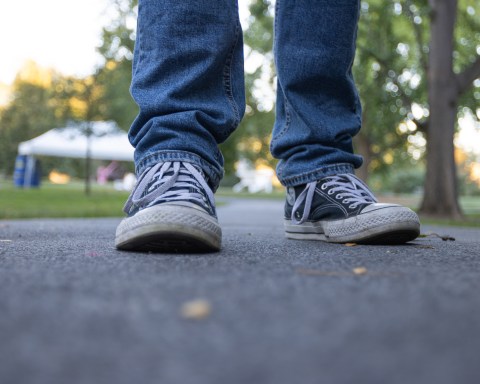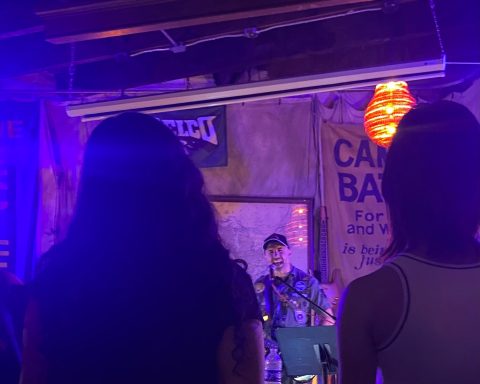Editor’s note: This article was initially published in The Daily Gazette, Swarthmore’s online, daily newspaper founded in Fall 1996. As of Fall 2018, the DG has merged with The Phoenix. See the about page to read more about the DG.
Chopin Without Piano has easily made a significant impact on Swarthmore College already still weeks before the theatrical experience finds its way to its North American premiere on October 24. Whether it’s the “lost pianos” scattered around campus, or the 15 minute recitals every Monday in Parrish Parlors, the community is practically buzzing with questions as it hums along to the melodies playing in the air.
The performance is being brought to Swarthmore largely through the funding of the Pew Center for Arts and Heritage, the William J. Cooper Foundation, and the incredible effort of the members of the College’s Departments of Theater and Music and Dance, specifically Allen Kuharski, Barbara Milewski, Andrew Hauze, and Matt Saunders.
Having previously been performed only in Europe, primarily in Poland, the arrival of Chopin Without Piano to Pennsylvania is an incredibly ambitious achievement and will be performed over two weekends at Swarthmore and in Philadelphia. The Philadelphia Chamber Orchestra will perform the two Piano Concertos which constitute the soundtrack and will be directed by Michal Zadara ’99.
As per the show itself, “It’s basically asking very big questions about what music means to us,” noted Swarthmore College Orchestra Director Andrew Hauze. “The biggest conceptual leap of the piece is that it takes the two Chopin Piano Concertos in their entirety and […] the piano is not played.” Actress Barbara Wysocka, who is encompassing the role of the piano, will serve as the dramatic monologist who must fill the void left and thereby justify the piano’s absence.
While the piano aspect is missing from the stage, we can be sure that our campus will not be exhibiting any particular need for baby grands in the coming weeks. As many travelers through the Science Center Courtyard are already aware, “lost pianos” are not as unrealistic a concept as one might think. With one already in the aforementioned courtyard, as well as one precariously and mysteriously balanced on its side near Beardsley Hall, these pianos are of a set of six which will appear randomly around campus as the concert date approaches, in addition to four others which can be spotted around Philadelphia.
Accordingly, students have developed affections for these instruments even going so far as to secure a tarp over the piano near the Science Center to prevent its degradation. But, this lack of protection and student initiation to do so raises some important questions. First and foremost, why leave ten pianos out in the open, unprotected? Second, what is trying to be communicated?
“We are not throwing away good pianos. We are exposing them to the elements, and encouraging people to be creative with them, in order to open up a broader conversation, but these pianos were all given away, and were on their way to a landfill. We’re trying to give these pianos one final hearing before they disappear,” Hauze explained.
“These pianos which were being thrown away are mostly from this era [the early and mid-twentieth century], where people had these pianos in their homes,” he continued. That is, the pianos newly inhabiting Swarthmore and Philadelphia are not just instruments, but physical manifestations of a desire to play and enjoy music, derived from another age. Putting them outside, in public view, where they will be rained on, is “essentially a way of shining a light on these questions about what live music and music making means to us,” says Hauze. Doing so challenges observers to face their interpretations and definitions of music and expression on a broader scale, especially in a world where new technologies and inventions take center stage.
“Music, science: these are all parts of […] the human condition,” noted Hauze. He added that though some may choose not to engage in the arts, “for the vast majority of people, some form of artistic expression is important.”
Additionally, the music of Chopin highlights the need to transcend the quantifiable through art. For Hauze, his works are masterpieces of the human emotion. “Chopin, he’s special in that sense,” said Hauze.
Swarthmore College welcomes Chopin Without Piano, with its arrival of lost pianos, wafts of music, and awakening concern for its preservation.
The performance, which is free and open to the public, will occur on October 24 at 8:00 p.m. at the Lang Concert Hall. For additional information and for the locations of other lost pianos, visit chopinwithoutpiano.com.
Featured image by Brandon Torres ’18/The Daily Gazette.















USE THE HASHTAG, SWATTIES: #ChopinWithoutPiano